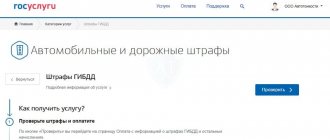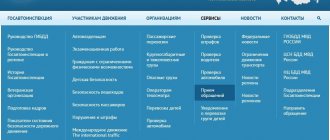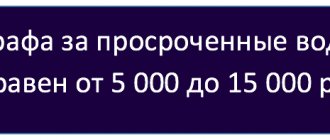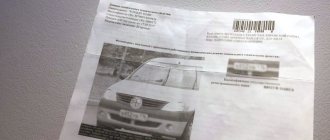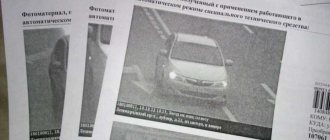When summoned to court for failure to pay a fine
They are summoned to court when the driver ignored notifications from the traffic police and bailiffs. Here's how it works:
- violated. For example, a driver drives behind a stop line at a traffic light;
- received a fine. The violation is noticed by the camera - the photo is sent to the traffic police. The inspector checks the data of the car and the driver, checks to see if the camera made a mistake, and issues a fine. Information about the fine goes into the traffic police database, and the decision is sent to the offender by mail;
- didn't pay on time. The driver ignores the letter. After 70 days they will try to collect the fine. To do this, the traffic police sends a copy of the resolution to the bailiffs within 10 days;
- received a request from the bailiffs. The bailiff formalizes enforcement proceedings and informs the driver about this in a new letter or via SMS;
- didn't pay the bailiffs. From receipt of the letter, the driver has 5 days to pay the traffic fine. If you miss this deadline, the bailiff will add an enforcement fee to the collection - 7% or at least 1000 rubles. There will be another 70 days to pay the debt;
- received a subpoena. If you miss the new 70 days, the bailiff will transfer the case to the state court authorities. The summons will be sent by mail.
It does not matter to the bailiffs whether the debtor received the letter. It is considered delivered even if the defaulter refused the letter or was not at home. Bailiffs also have the right to send notifications through State Services - if the debtor has entered the portal, he is considered notified.
Court for failure to pay a traffic police fine - what punishment awaits the driver in 2021
The traffic police have up to 60 days to pay fines. However, not all drivers pay off their debt on time. Delay is also an offence. According to the law, a violator may face trial for an unpaid fine.
Features of paying fines
The law allows a maximum time period of 70 days for the payment of fines, of which:
10 – the possibility of appealing the accrued penalties;
60 – the period during which it must be repaid (Part 1 of Article 32.2 of the Code of Administrative Offenses of the Russian Federation).
After 70 days, failure to pay the fine becomes an offense, which will be followed by an administrative penalty. According to clause 12, part 5, art. 28.3 of the Code of Administrative Offenses of the Russian Federation, traffic police officers have the right to:
send documents on the resulting debt to the bailiffs, who will collect it;
independently draw up a protocol on non-payment and send it to the court.
In this case, one can be brought to justice only within 3 months from the end of the period given for paying the fine. (Part 1 of Article 4.5 of the Code of Administrative Offenses of the Russian Federation).
The same code (Article 31.9) allows for the possibility of complete exemption from penalties for traffic violations if two years have passed since the decision was made, but it has not been executed.
Types of liability for unpaid fines
The defaulter is summoned to court for non-payment, where he is given a certain type of punishment. The types of administrative sanctions are prescribed in Article 20.25 of the Code of Administrative Offenses of the Russian Federation:
double the amount of the accrued fine;
50 hours of community service;
arrest for up to 15 days.
It is impossible to imprison a debtor for 15 days if fines were assessed as a result of viewing data from video cameras (clause 3 of the Note to this article).
The imposition of any penalty does not relieve the person from the obligation to pay the initial fine. In addition, if there is a debt regarding the debtor’s car, measures can also be taken, such as:
prohibition on any registration procedures, for example, sale, deregistration, etc.;
refusal to undergo a technical inspection and obtain an insurance policy;
arrest and sent to the impound lot.
If the period of non-payment is 80 days, bailiffs have the right to forcibly collect money (229-FZ dated 10/02/2007) up to:
sending an order to collect arrears of a fine from the defaulter’s wages to his employer;
seizure of a bank account or writing off debt from it;
restrictions on traveling abroad (with a total debt of more than 10 thousand rubles).
The measure indicated in the last paragraph is not always effective. There is a possibility of traveling abroad through Belarus. There, customs officers do not detain Russian drivers because of outstanding fines.
What happens if you fail to appear in court?
If the defaulter did not receive a summons to court on time and did not appear at the meeting, the “themis” may:
reschedule the consideration of the administrative case;
make a decision on collection in the absence of the debtor and then send the resolution to the place of its registration;
oblige the authorities that sent the protocol on the offense to the court to find the debtor and bring him to the courtroom.
This fact is not an additional aggravating circumstance. However, if it is not possible to attend the meeting on time, you should inform about this in advance and explain the reason. If she is found to have reasonable cause, the trial will be rescheduled for another day.
Possibility of deferment
If the debtor is currently in a difficult financial situation, but agrees to pay the fine in installments, the law allows this. Features of debt deferment include the possibility of:
shift the payment deadlines by one month if it is not possible at the moment;
pay the debt in installments over a maximum of three months in case of difficulties with funds;
For stateless persons and foreigners, deferments are excluded.
In order for the court to consider the possibility of deferment of debt payment, you need to provide it with a corresponding application and attach documents confirming the presence of financial problems.
Sanctions imposed by traffic police officers are not always fair. But if it is not possible to prove their groundlessness in time, it would be more correct to pay the fine within the time limits provided by law. You shouldn't rely on luck. Delays by debt collection authorities are the rare exception and not the rule.
Video
What to do if you are summoned to court for failure to pay a traffic fine
If fines have been paid, collect proof of payment. It happens that the data on the repayment of the fine was not included in the traffic police database or the bailiff did not check it and sent the case to court.
Alexander Torvard, auto lawyer If the driver has paid off all debts, but still receives a summons to court, it is necessary to collect all receipts for payment of fines and present them to the judge. The judge will take them into account and issue an order to dismiss the case.
If there was no payment, pay and keep the receipts. It happens that for some reason the driver does not check his mailbox and email for a long time. In this case, he may miss the letter from the traffic police, and then from the FSSP. In such a situation, bailiffs will send documents to the court. If the debtor nevertheless checked the mail and found a summons there, he urgently needs to pay off all debts. If the bailiffs have already issued a fine, you do not need to pay the amount ordered by the traffic police.
You can go to court with payment receipts. Most likely, liability will be nullified and the judge will dismiss the case. If you miss the subpoena, everything will be decided without the debtor.
What are the consequences of failure to pay a traffic fine?
Most often, bailiffs write off money from a bank account - they are obliged to do this first. If there is not enough money in the account, the bailiffs will order the bank to transfer the money to the specified account. As soon as the money appears in the account, the bank will immediately transfer it to the bailiffs.
Revocation of driver's license. The judge has the right to suspend the license. If the driver violates this decision, he will be punished - 50 hours of work or deprivation of his license for up to a year.
Double increase in fines. The judge has the right to issue such a punishment.
Restrictions on traveling abroad. If the amount of debt is 30,000 rubles or higher, the debtor will be limited in the rights to travel outside of Russia.
Seizure of personal property. The bailiffs will resort to this measure if the debtor does not have the required amount in his account to repay the debt. A citizen has the right to indicate what property bailiffs can seize. This is stated in paragraph 5 of Art. 69 of the law on enforcement proceedings.
Arrest or work. The court may order administrative detention for 15 days or correctional labor. For evading work, a fine of up to 300,000 rubles or arrest for 15 days is imposed.
Failure to pay traffic fine
Motorists know that traffic accidents involve monetary penalties. According to the law, “chain letters” are required to be paid for. Ignoring these requirements will result in delays and accumulation of driver debts. As a result, negligent car owners may face forced debt collection through bailiffs. Failure to pay a traffic police fine is an administrative offense that is punishable in accordance with the Code of Administrative Offenses of the Russian Federation.
What is non-payment of a fine?
Non-payment is considered a delay in transferring funds to the bank account of the local traffic inspection office. The time allotted for debt repayment is considered to be a period of 60 days. A 10-day period is also taken into account during which the violator has the right to appeal the traffic police inspector’s report.
On a note! At the end of 70 days, traffic police officers wait another 10 days, after which they transfer the case to the bailiffs. This practice allows you to process a payment that was sent on the last day of the payment deadline. If the money has not been received into the bank account, the violator will be charged with non-payment to the traffic police.
Thus, non-payment is generally considered to be deliberate or otherwise ignoring the payment of a fine for committing an accident. And it doesn’t matter what size the debt will be. In case of delay, the amount is subject to additional duties in the form of penalties.
Who can collect fines?
Many car owners are wondering who is involved in the case if they are summoned to court under a subpoena? But the court does not initiate, but only considers cases transferred to it by inspectors or bailiffs (clause 12, part 5, article 28.3 of the Code of Administrative Offenses of the Russian Federation). The main claim will be a protocol on an administrative offense on the road. The document is drawn up by a traffic police inspector directly at the scene of the accident or a little later.
Features of collection:
While patrolling the road situation, traffic police inspectors have the right to stop vehicles to check documents. Sometimes the police know the license plate number and make of the car of malicious toll evaders. But most often, current debts are found out from a remote database, which is available to all traffic police inspectors. Having discovered an unpaid fine, the validity period of which has not exceeded the prescribed norm, the traffic police officer issues a protocol on an administrative violation.
According to the law, a traffic police inspector also has the right to detain a negligent driver and take him to court to clarify the circumstances of non-payment. The time of detention on a non-working day can be up to 48 hours (Article 27.5 of the Code of Administrative Offenses of the Russian Federation).
It is in the driver’s interests to pay the debt to the traffic police on time. Otherwise, administrative measures will be applied to him in accordance with the Code of Administrative Offenses of the Russian Federation.
Liability for non-payment
Perhaps there is no need to remind you what the consequences are for failure to pay a traffic fine within the time period allotted by law (60 days + 10 days). By leaving things to chance, the car owner risks parting with a much more serious amount than what is stated in the payment receipt.
Penalties for non-payment in 2021:
- Imposition of a second fine in the amount of the unpaid debt (in total, the violator will be forced to pay the debt in double amount);
- Mandatory work up to 50 hours;
- Temporary restriction of freedom for up to 15 days.
- The likelihood of a ban on traveling abroad (if the amount of debt is over 10 thousand rubles and there is a court order).
Important: An arrest is allowed only if the offender was stopped by a traffic police inspector. Recording with video cameras does not apply to this circumstance.
It is equally important to figure out whether a driver’s license can be revoked for late payment? There are no explanations in the law on this matter, which means that drivers are not threatened with such a measure. However, experts advise taking debt payment receipts with you on your trip. This will save the driver from being dragged around ships by inspectors and having the car evacuated to a special parking lot.
Where to check for unpaid fines
Service "Traffic Police Fines". Two documents are enough - a vehicle registration certificate (CTC) and a driver's license. Enter their numbers in the appropriate fields of the form, also indicate the car number and email address.
Enter the email address that you check regularly so as not to miss letters from the traffic police and the FSSP. This will save you from getting a subpoena
Traffic police website. To check, you will need car registration plates and STS number.
Government services. You can check fines on this portal, but to do this you will have to register and go to the nearest MFC. After this, you will need to enter the car data in your personal account and start checking.
Remember
- The deadline for paying traffic fines is 70 days. If you miss this deadline, the case will be transferred to the bailiffs, who will issue a new fine. The deadline for paying the second fine is also 70 days.
- The traffic police may be called to court for non-payment of a fine if the driver missed payment notices from the traffic police and bailiffs. FSSP employees take the case to court.
- If you were summoned to court, check whether the fine was paid. If there was, collect the receipts and present them to the court. If you haven’t paid yet, do it urgently and go to court with the receipts.
- If you do not pay the fine and do not appear in court, the decision will be made without the debtor. The judge has the right to issue a ruling with one of the penalties: write off money from the account, suspend rights, restrict travel around the world, double the fine or seize property.
- You can check traffic police and FSSP fines on the “State Traffic Police Fines” website.
All articles by the author: Evgeniy Lesnov
Unpaid traffic fines
The question that concerns all motorists is what will happen if you do not pay the traffic police fine. You can answer that the debtor will have big problems. Unpaid collection is a violation on the part of the motorist. In our country, liability is provided for violations.
Responsibility for unpaid penalties from the traffic police is prescribed in the Code of the Russian Federation on Administrative Offences. In Art. 20.25 states that failure to pay a fine on time threatens to double the monetary penalty, or arrest for 15 days, or compulsory work for up to 50 hours.
Art. 20.25 of the Code of Administrative Offenses is applied only after failure to pay the fine on time is recorded. The established period for repayment of the foreclosure is 60 days. A motorist is given 10 days to appeal the decision to sanction a fine for violating traffic rules. The period is counted from the moment the letter is received. After this, there is a 60-day period in which the motorist must pay the collection on his own.
If the violator pays off the penalty within 20 days, he receives a 50% discount. In fact, he pays half the amount. When a person does not deposit money within 60 days, he is subject to non-payment of traffic fines. The information goes to the inspectorate, which transmits the data to the court and bailiffs. Recently, bailiffs have begun to actively cooperate with the State Traffic Inspectorate in this area. Employees of the Federal Bailiff Service are beginning to take enforcement action to collect the debt.
